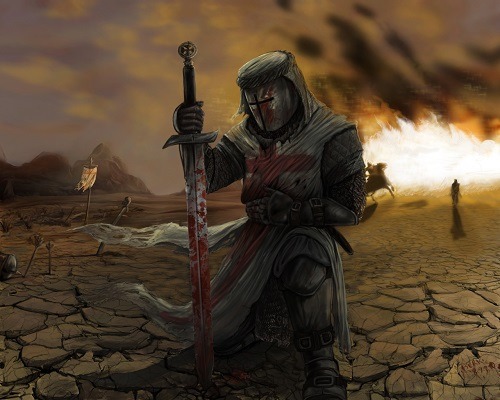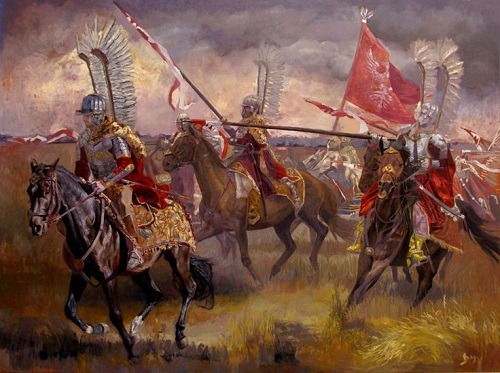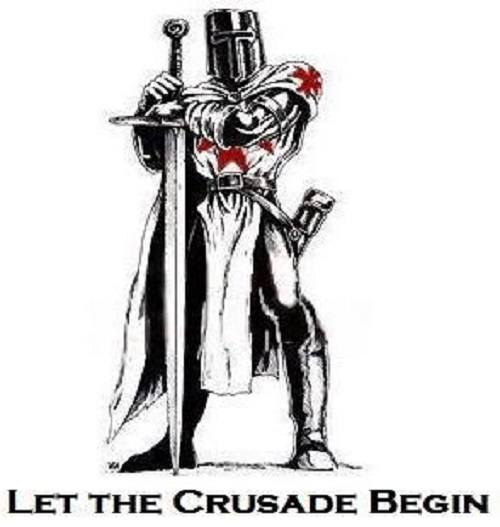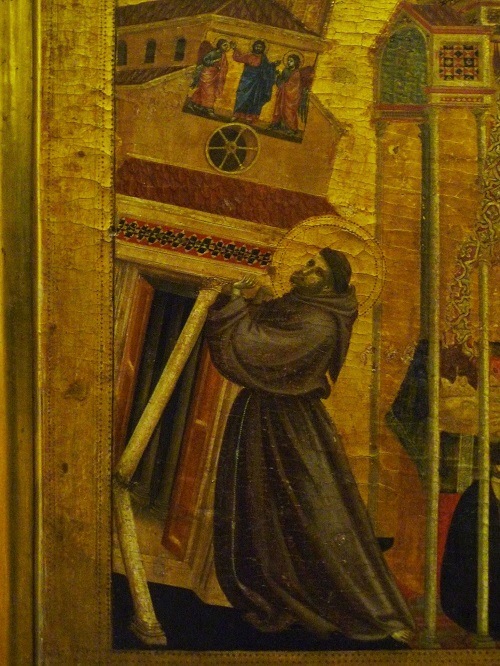In recent years, the Alt-Right—along with the Alt-West, Alt-Lite, and the Hard Right—has come to the forefront of the political scene. This has been due in large part because right-leaning individuals have come to realize just how ineffective standard “conservatives” are at battling the Left. And given the left-leaning socio-cultural changes that have swept the West under the guardianship of standard conservatives, it is quite understandable that many young traditionalists have gravitated to a political alternative like the Alt-Right.
But just as with modern conservativism, the same sorts of problems exist for modern Christianity. Indeed, under the “watchful” eye of standard conservative Christians, Christianity in the West has become more liberal, more feminized, more Churchian, and entirely less Christian! As such, is it any wonder that many Christian men are leaving Christian churches and are searching for an alternative to the weak-kneed Churchianity that they see around them. Of course not. But is there any Christian alternative to be had? Indeed there is, and it is called Alt-Christianity.
What is Alt-Christianity? In one sense, Alt-Christianity is a new way of looking at Christianity; it is a new Christian mindset, if you will. And as we know from fitness and game, changing one’s mindset is often the key change that needs to be made for exponential personal development and growth. At the same time, Alt-Christianity also aims to be a means by which orthodox Christianity could be revived amongst men in the West. And since traditional Christianity is a pillar of Western Civilization, the importance of this goal can be overstated.

Now, in terms of its general tenets, Alt-Christianity can be summarized by the following 21 points (and note that these points were largely inspired by Vox Day’s 16 Points concerning the Alt-Right):
1. Both theologically and morally, Alt-Christianity is traditionalist and right-leaning. It is also more focused on shared morality and mere-Christianity than on denominational differences. However, Progressive-Christianity, Liberal-Christianity, and Feminist-Christianity are not Alt-Christianity.
2. Alt-Christianity is an alternative to the mainstream Christian conservative movement in the West which has, whether wittingly or not, been largely infected with strains of progressivism, materialism, feminism, SJWism, over-ecumenism, and Churchianism. Alt-Christianity has seen the socio-cultural results of these infections on the Christian faith and thus pro-actively and overtly fights against them, rather than ignoring, accommodating, or even indulging them, which many modern Christian movements do. And the fight against these problems is done first within the church, and then against them outside of the church.
3. Alt-Christianity is not defensive in nature and, just like Christ, it rejects the elevation of niceness, tolerance, and likeability over Christian truth. It holds an “initiative-maintaining” mindset and believes in victory through persistence, sacrifice, materialistic minimalism, and remaining in harmony with objective reality, historical truths, and psychological/biological facts about human nature.

4. Alt-Christianity firmly believes in the use of reason; however, since Alt-Christianity knows that men are not usually moved by dry arguments, it is also willing to use truth-focused polemics, biting rhetoric, humorous memes, and imaginative narratives to make it points.
5. Concerning faith and morals, Alt-Christianity is skeptical of any attempts to redefine the clear sayings, implications, and example of Christ and the rest of the New Testament, or Christian tradition, in order to accommodate modern sensibilities.
6. Alt-Christianity recognizes that all men are made in the image of God and that all men will be judged, but beyond this, Alt-Christianity rejects the idea of earthly equality for all practical purposes given the observable lack of anything like natural equality existing or possibly existing amongst men. For the same reason, Alt-Christianity denies human perfectibility and earthly utopianism.
7. Alt-Christianity believes traditional Western Civilization is the best civilization that Man has ever created. It also holds that traditional Christianity is a key pillar of that civilization. As such, Alt-Christianity supports the roots of traditionalist Christianity: namely, the traditional family, patriarchy, “red-pill” knowledge, Christian education, and apologetics in the full and broadest sense.

8. Given the above, Alt-Christianity wishes to see traditional Western Civilization maintained, and is thus open to whatever political system shows itself best suited to the maintenance of that civilization. At the same time, Alt-Christianity realizes that civilizations and nations are maintained by people, and that not all people are created equal. As such, Alt-Christianity supports the implementation of whatever specific political and cultural practices are best suited to allow a particular people to maintain traditional Western Civilization. Simultaneously, Alt-Christianity supports restricting whatever specific political and cultural practices undermine a particular people’s ability to maintain traditional Western Civilization.
9. Alt-Christianity is nationalistic. It supports the right of all distinct ethno-ideological/religious groups to exist as distinct groups, and to defend their existence. Alt-Christianity is also anti-globalist in the political sense, but believes in unity amongst nations through a shared Christian faith. Ultimately, Alt-Christianity remembers the lesson of the Tower of Babel and realizes that ethno-states are a lesser threat to Christianity than a global political entity is.
10. Alt-Christianity see no conflict between science and Christianity, but it is not naïve enough to ignore the fact that there is a difference between certain scientific claims and the interpretation of scientists—many of them actively anti-Christian—concerning those claims. Thus, Alt-Christianity takes an attitude of tentative acceptance, coupled with skepticism, concerning the findings of modern science, especially those of a historical rather than an experimental nature.
11. Alt-Christianity believes that identity—both in the ethnic and the religious sense—is the catalyst for culture, which is itself more important than politics. As such, the Alt-Christian is both verbally and non-verbally overt in his Christian identity.

12. Alt-Christianity is opposed to the unrequested rule, domination, or excessive influence (by any means) of any ethnic and/or religious group or Christian denomination over another; as such, Alt-Christianity supports the right of de facto or de jure self-determination / segregation for ethnic and/or religious reasons.
13. Alt-Christianity is more interested in the approval of God than of men; it knows that the Prince of this World is its enemy and that, as Jesus warned, the world will hate it. Thus, the Alt-Christian is not interested in being “respectable” in the eyes of non-Christians, nor does the Alt-Christian care about the negative labels that non-Christians will inevitability place on him.
14. Alt-Christianity is opposed to the separation of church and state in an absolute sense, for Alt-Christianity understands that the absolute separation of church and state always leads to the state, and/or the enemies of the church, using the resources and laws of the state to undermine the church.
15. Alt-Christianity is more interested in the Faith than in earthly charity, although it strongly encourages the latter because it is mandated by, and supports, the former. However, the Alt-Christian knows that charity begins first at home, and only then extends outward. Furthermore, virtue-signaling charity is a vice, and so whoever allows his own family, his nation, and the Faith itself to be undermined for the sake of virtue-signaling charity is worse than an unbeliever.

16. Alt-Christianity is pro-“capitalism” in terms of policy, but pro-socialist in terms of personal charity; it holds that a man who freely does not work, but can, shall not eat, but a man who wishes to work but cannot, shall not be hungry.
17. Alt-Christianity believes that we must secure the existence of Christians in general, but that we must also specifically secure the existence of Christians in countries of European heritage and ancestry, for as Belloc said: “Europe is the Faith, and the Faith is Europe”.
18. Alt-Christianity believes that Christianity is true, but it also sees truth and value in other religions. As such, while holding Christianity as the best and most complete faith, and boldly proclaiming it as such, Alt-Christianity does not, in principle, ignore or reject the insights of non-Christian religious or cultural traditions.
19. Alt-Christianity believes in evangelism. However, the Alt-Christian remembers to wipe the dust off his feet from those who, in full knowledge and Godly-freedom, reject Christianity. Thus, Alt-Christianity rejects the non-evangelism of liberal-Christianity as well as any imperialist attempts at the imposition of Christianity by force or coercion.

20. Alt-Christianity values personal strength, intellectual boldness, masculinity, and the Christ who overturned tables. Indeed, Alt-Christianity realizes that Christ was not followed because He allowed Himself to die, but rather because He was the ultimate alpha male who conquered Man’s greatest enemy: namely, death.
21. Finally, just as the man Jesus Christ and his male Apostles led the first Christians, so too is Alt-Christianity meant to be led by men. After all, the failures of the West ultimately fall on the heads of its men, and so it is men that must lead the West back to its traditional roots.
Now, will embracing these 21 tenets of Alt-Christianity reverse the slide of orthodox Christianity in the West? Frankly, I do not know. But I do know that making the mindset change to Alt-Christianity is surely better than continuing the ineffective tactics of the past few generations.
Read More: Why You Should Avoid The Cucked Interpretations Of Modern Christianity